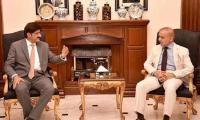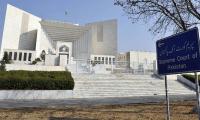ISLAMABAD: Prime Minister Imran Khan has said whenever the country goes to the International Monetary Fund (IMF), it is compelled to accept its terms and conditions, and when it accepts its conditions for taking a loan, the country’s security is compromised.
He was addressing a function, held here on Friday for launching the public version of the National Security Policy. He said that Pakistan had evolved under very insecure conditions, pointing out that the forces of other Muslim countries such as Libya, Somalia, Syria, Afghanistan have not been able to protect their respective countries as compared to the way our security forces have protected the country in the war on terror.
However, he emphasised that there are many aspects of security and military security is an aspect of the national security. “If we focus on one aspect, we have the example of the Soviet Union that even the most powerful forces in the world could not hold the Soviet Union together. We are trying to move our government, the people in one direction. If the economy is not right, you cannot protect yourself for long,” he contended.
He maintained that “if you have to go to the IMF after some time, it means that your security will be affected, because we have never had the concept of joint national security”. He added that “even in the economy, it was never understood how to protect ourselves, the growth rate was increasing, the current account deficit was increasing, which put pressure on the rupee and we had to go to the IMF”.
Prime Minister also said “whenever they go to the IMF, they are compelled because as a last resort, only the IMF helper is left, which gives the cheapest loan. “But to get a loan from the IMF, you have to accept their terms and when you accept the terms, there is a security compromise somewhere; which does not have to be the security forces, but it means you have to put the burden on your people and the biggest security is that the people stand with you,” he argued.
He continued that the “concept of comprehensive growth in the national security policy i.e. as long as we do not develop as a nation and only one section develops, that nation will always be insecure”.
He emphasised, “security comes when everyone understands that we are part of this nation; so the first concept of inclusive growth came in the state of Madinah when it was decided that the state would take responsibility for every weaker section”.
The prime minister said the Islamic welfare concept is seen in most of the Scandinavian countries, in any case a state takes responsibility for its weaker class which then becomes a stakeholder and real power to save this state.
He pointed out when the forces used to come to India from Afghanistan, they would not face any resistance and there was a direct battle on Panipat because there was a vadera system, i.e. whoever was sitting on top had all the power, money, and the lower class had no part to play in the country so their lives did not matter, no matter who came up.
In contrast, in the tribal areas, Afghanistan had a democratic system, the jirga system gave people justice and valued their freedom, so they resisted those who attacked them.
PM Imran said the concept of inclusive growth is to protect the lives of the weakest sections and for this purpose, every family has been protected by providing health insurance which is not even in the developed countries of the world.
Earlier, the PM launched the public version of the first-ever National Security Policy document at a ceremony at the Prime Minister’s Office. The launch ceremony was attended by federal ministers, national security adviser, parliamentarians, chairman joint chiefs of staff committee, all services chiefs, senior civil and military officials, members of academia, think tanks, media and civil society.
PM Imran Khan, in his keynote address, explained the significance of his government’s successful initiative of producing the National Security Policy. He said the National Security Policy was a major priority of his government. He congratulated the national security adviser and his team for completing the task. He also highlighted the importance of the policy’s successful implementation and announced that the National Security Committee (NSC) will regularly review progress.
He explained that the National Security Policy 2022-2026 centres on the government’s vision, which believes that the security of Pakistan rests in the security of its citizens. “Any National Security approach must prioritise national cohesion and the prosperity of people, while guaranteeing fundamental rights and social justice without discrimination.
“To achieve the vast potential of our citizens, it is necessary to promote delivery-based good governance,” he said. The PM emphasised that “our armed forces are our pride and glue the nation together. Given the threats we face in the region, and the growing threat of hybrid warfare, they will continue to receive even greater support and importance”.
The prime minister explained that “the foremost aim of our foreign policy and military capability will remain peace and stability in the region and beyond. Our foreign policy will also focus much more on economic diplomacy going forward”.
National Security Adviser Dr Moeed Yusuf briefly explained the National Security Policy vision and thanked the PM and all officials for their constant support.
He said the National Security Policy has taken a broad view of national security as both traditional and non-traditional issues impacted our security. While the National Security Policy is centred around economic security, the geo-strategic and geo-political imperatives also feature prominently to strengthen Pakistan security and standing in the world, he remarked.
He highlighted that this was a document finalised after full civil-military consensus. The policy emphasises a geo-economic vision to supplement the focus on geo-strategy and highlights that the foremost aim of Pakistan’s foreign policy and military capability was peace and stability in the region and beyond, based on mutual respect and sovereign equality, APP reported.
The main themes of the NSP are national cohesion, securing an economic future, defence, and territorial integrity, internal security, foreign policy in a changing world, peace with India with focus on Kashmir solution and cyber data security.
The policy is aimed at addressing three critical economic challenges, external imbalance, socio-economic inequalities, and geographic disparities between developed and under-developed regions of Pakistan.
The document emphasises the non-negotiable focus on defence and territorial integrity of Pakistan, strengthening space-based technology and its application, and combating hybrid warfare through enhancing information and cyber security.
Regarding internal security, the policy seeks to ensure writ of the state across the country, zero-tolerance towards terrorism, extremism, and violent sub-nationalisms, and fighting the menace of organised crimes.
A just and peaceful resolution of the Jammu and Kashmir dispute in accordance with the UNSC resolutions has been declared a vital security interest for the country.
The national security document would provide for pursuing youth-focused policies, guaranteeing food security, improving preventive healthcare, and mainstreaming climate adaptation.
Awami Muslim League chief appeared in the court with his lawyers Sardar Raziq and Sardar Shehbaz
Board meeting also allowed increase in business center and commercial area of hotel plots from 5 to 10 percent along...
Foreign exchange reserves currently stand at $8 billion, while Pakistan would also receive $1.1 billion IMF tranche:...
CM directed that the enforcement authorities be made functional in six months, and legislation in this regard be...
Pakistani soldiers and policemen stand guard outside the Haripur central jail. — AFP/FileWASHINGTON: The Pakistani...
Establishment Division has also issued an NoC to fill 465 civilian posts in the Ministry of Defence and 11 posts in...







